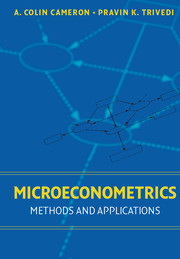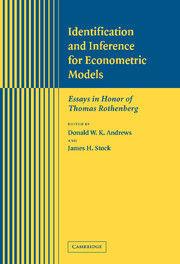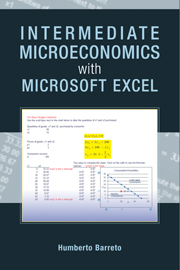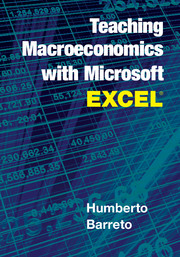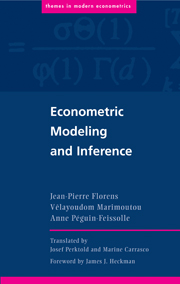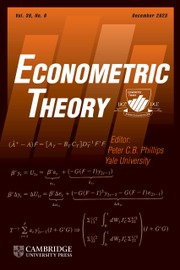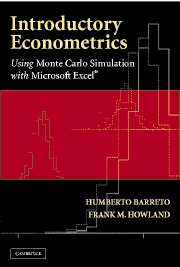
Introductory Econometrics
Using Monte Carlo Simulation with Microsoft Excel
£70.99
- Authors:
- Humberto Barreto, DePauw University, Indiana
- Frank Howland, Wabash College, Indiana
- Date Published: March 2006
- availability: Available
- format: Hardback
- isbn: 9780521843195
£
70.99
Hardback
-
This highly accessible and innovative text with supporting web site uses Excel (R) to teach the core concepts of econometrics without advanced mathematics. It enables students to use Monte Carlo simulations in order to understand the data generating process and sampling distribution. Intelligent repetition of concrete examples effectively conveys the properties of the ordinary least squares (OLS) estimator and the nature of heteroskedasticity and autocorrelation. Coverage includes omitted variables, binary response models, basic time series, and simultaneous equations. The authors teach students how to construct their own real-world data sets drawn from the internet, which they can analyze with Excel (R) or with other econometric software. The accompanying web site with text support can be found at www.wabash.edu/econometrics.
Read more- Active learning with highly accessible introductory text using computers and web site support rather than passive reading
- Well-prepared Excel (R) workbooks enable easy Monte Carlo simulation and other analyses
Reviews & endorsements
'Hats off to Barreto and Howland for a clearly-written text that introduces the undergraduate to data analysis and econometric techniques using Excel. The book's strength is in using Monte Carlo simulation to illustrate sampling theory and the Gauss Markov theorem. I am in total agreement with the authors that computer-based exercises help to make abstract concepts operations and meaningful. Most juniors and seniors are familiar with the basic features of Excel spreadsheets. Showing them how to use SOLVER, the DATA ANALYSIS TOOLS, and to run Monte Carlo simulations, allows an instructor to take a familiar tool (Excel) and use it to introduce undergraduates to econometrics in an intuitive and non-threatening way.' Jon M. Conrad, Cornell University
See more reviews'Barreto and Howland have taken a truly innovative approach to teach undergraduate econometrics, using computer simulation methods to illustrate and clarify difficult topics. Fully integrated with Microsoft Excel, this textbook forces students to take a hands-on approach to the subject. There is no better way to learn econometrics than by doing econometrics!' Jason Abrevaya, Purdue University
'Barreto and Howland have done an excellent job of producing an introductory econometric textbook based on Excel software combined with a well written and applied intuitive approach to econometrics. In my opinion, their teaching philosophy is absolutely the correct method: Put the student in front of a computer and teach econometrics by doing econometrics.' Daniel V. Gordon, University of Calgary
'The authors wrote a textbook on introductory econometrics which is different from most textbooks by using Monte Carlo simulation with Microsoft Excel. The book is written for undergraduate students in econometrics who should not be explicitly confronted with formal mathematics but instead with visual explanations of abstract ideas.' Zentralblatt MATH
Customer reviews
Not yet reviewed
Be the first to review
Review was not posted due to profanity
×Product details
- Date Published: March 2006
- format: Hardback
- isbn: 9780521843195
- length: 800 pages
- dimensions: 259 x 185 x 51 mm
- weight: 1.56kg
- contains: 4 tables
- availability: Available
Table of Contents
1. Introduction
Part I. Description:
2. Correlation
3. Pivot tables
4. Computing regression
5. Interpreting regression
6. Functional form
7. Multivariate regression
8. Dummy variables
Part II. Inference:
9. Monte Carlo simulation
10. Inferential statistics review
11. Measurement box model
12. Comparing two populations
13. The classical econometric model
14. The Gauss Markov theorem
15. Understanding the standard error
16. Hypothesis testing and confidence intervals
17. F tests
18. Omitted variable bias
19. Heteroskedasticity
20. Autocorrelation
21. The series topics
22. Dummy dependent variables
23. Bootstrap
24. Simultaneous equations.Instructors have used or reviewed this title for the following courses
- Energy Data Analysis
- Financial Models and Business Analysis
- Int'l Pol Economy
- Introductory Econometrics
- Quantitative Methods in Real Estate
Sorry, this resource is locked
Please register or sign in to request access. If you are having problems accessing these resources please email [email protected]
Register Sign in» Proceed
You are now leaving the Cambridge University Press website. Your eBook purchase and download will be completed by our partner www.ebooks.com. Please see the permission section of the www.ebooks.com catalogue page for details of the print & copy limits on our eBooks.
Continue ×Are you sure you want to delete your account?
This cannot be undone.
Thank you for your feedback which will help us improve our service.
If you requested a response, we will make sure to get back to you shortly.
×
